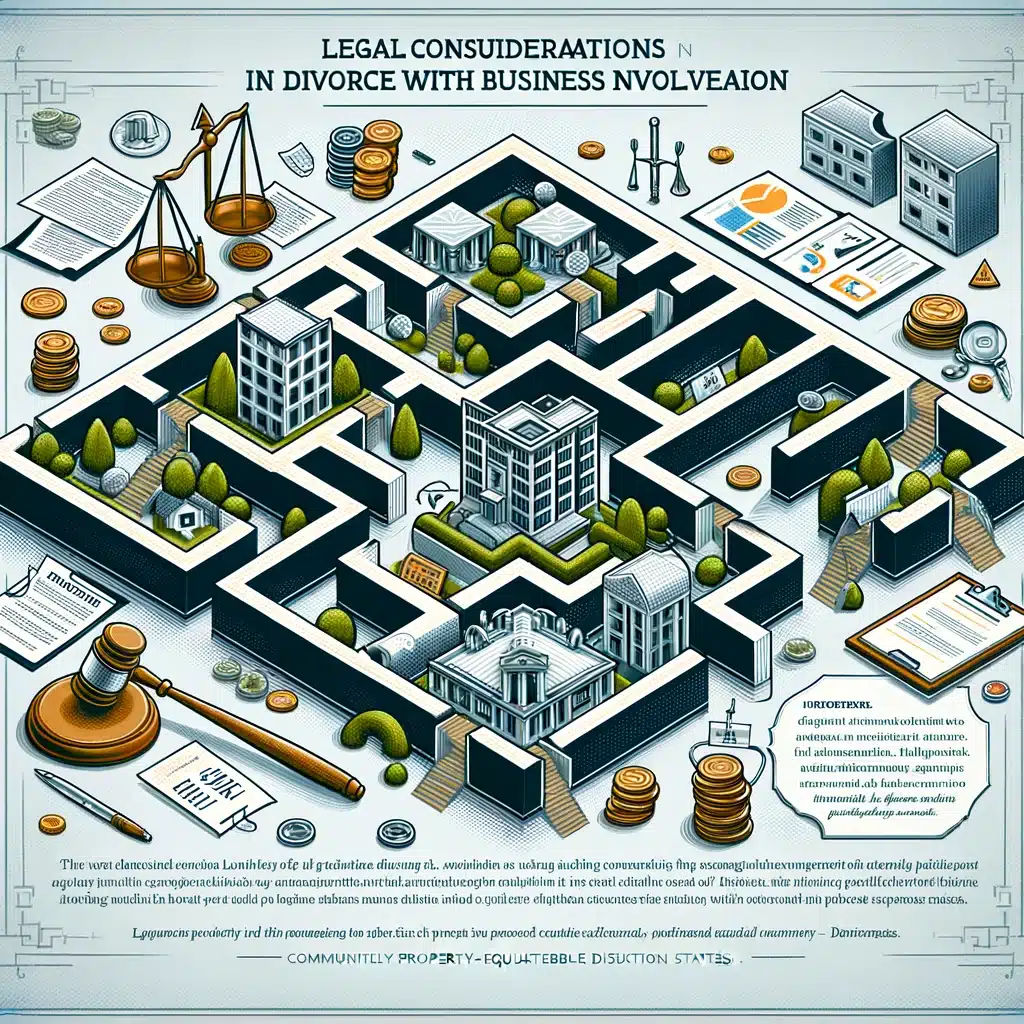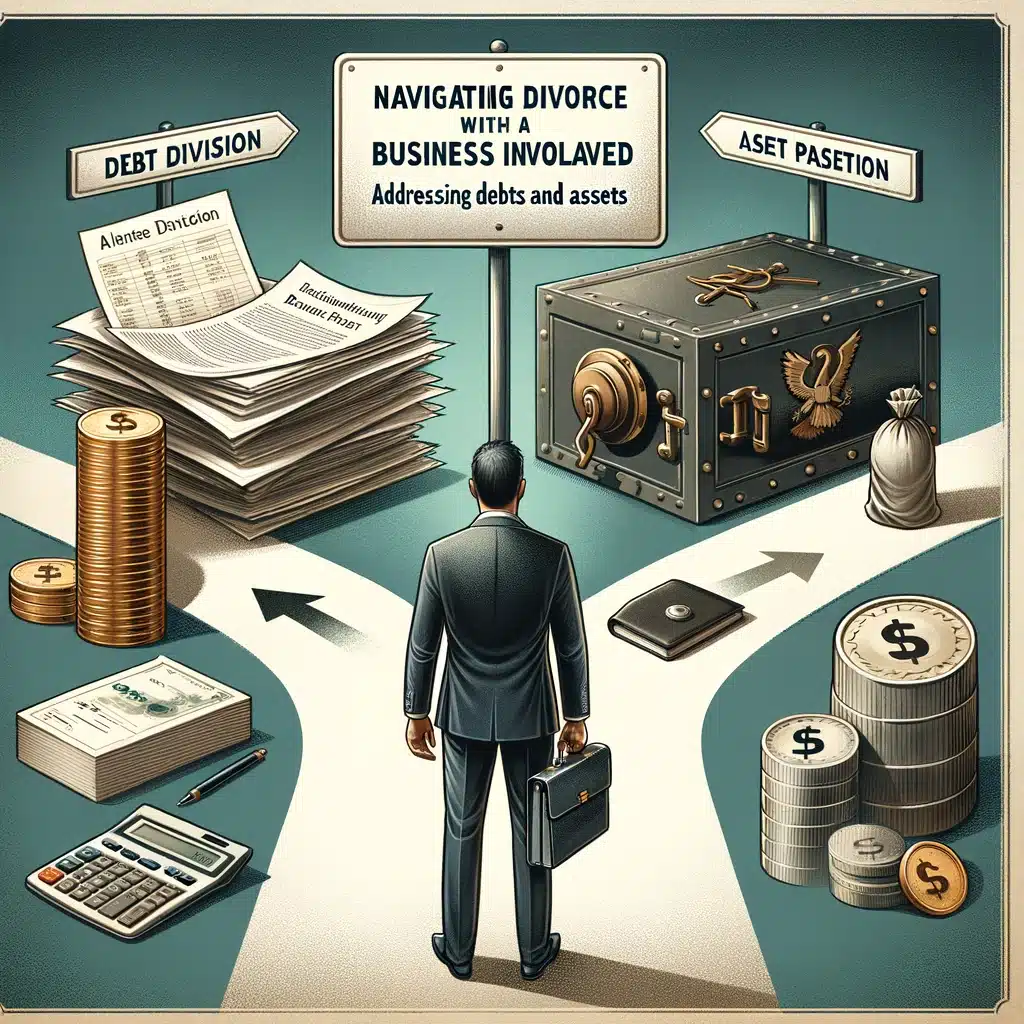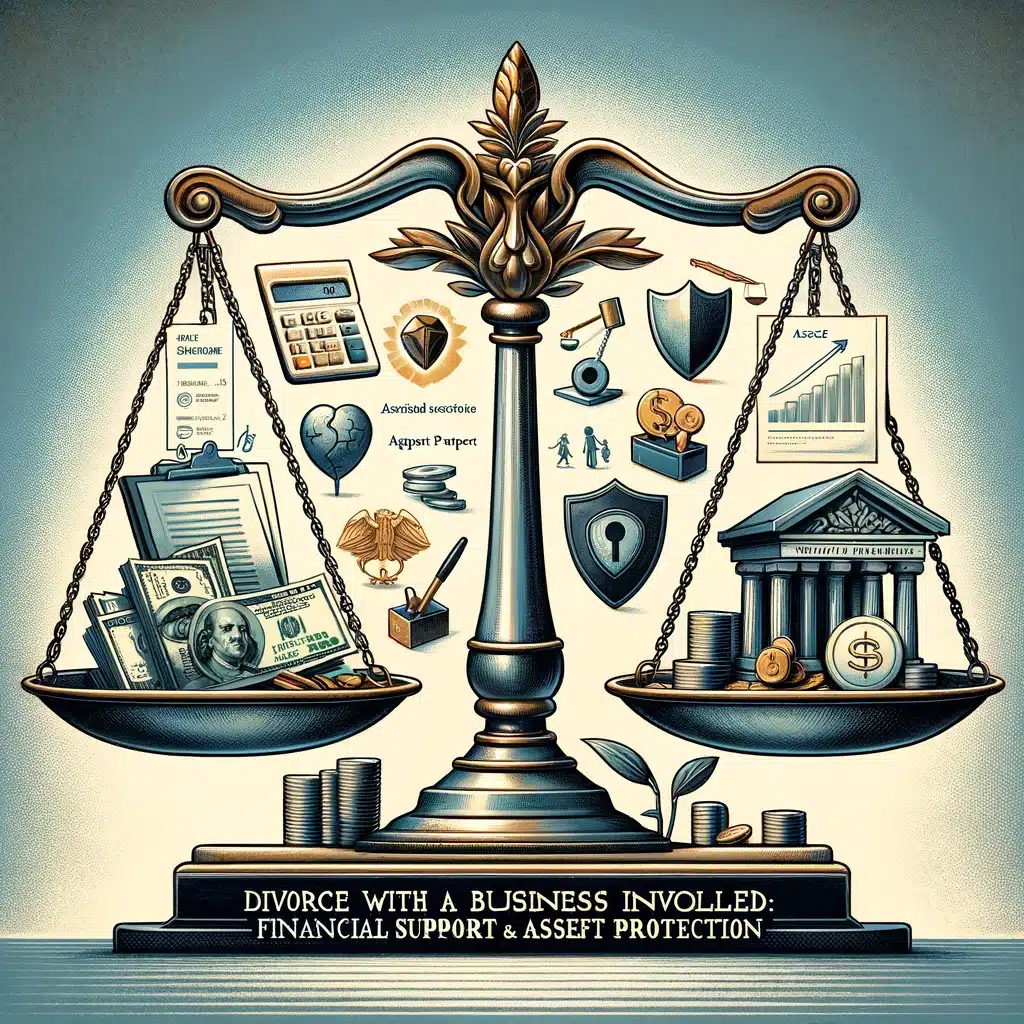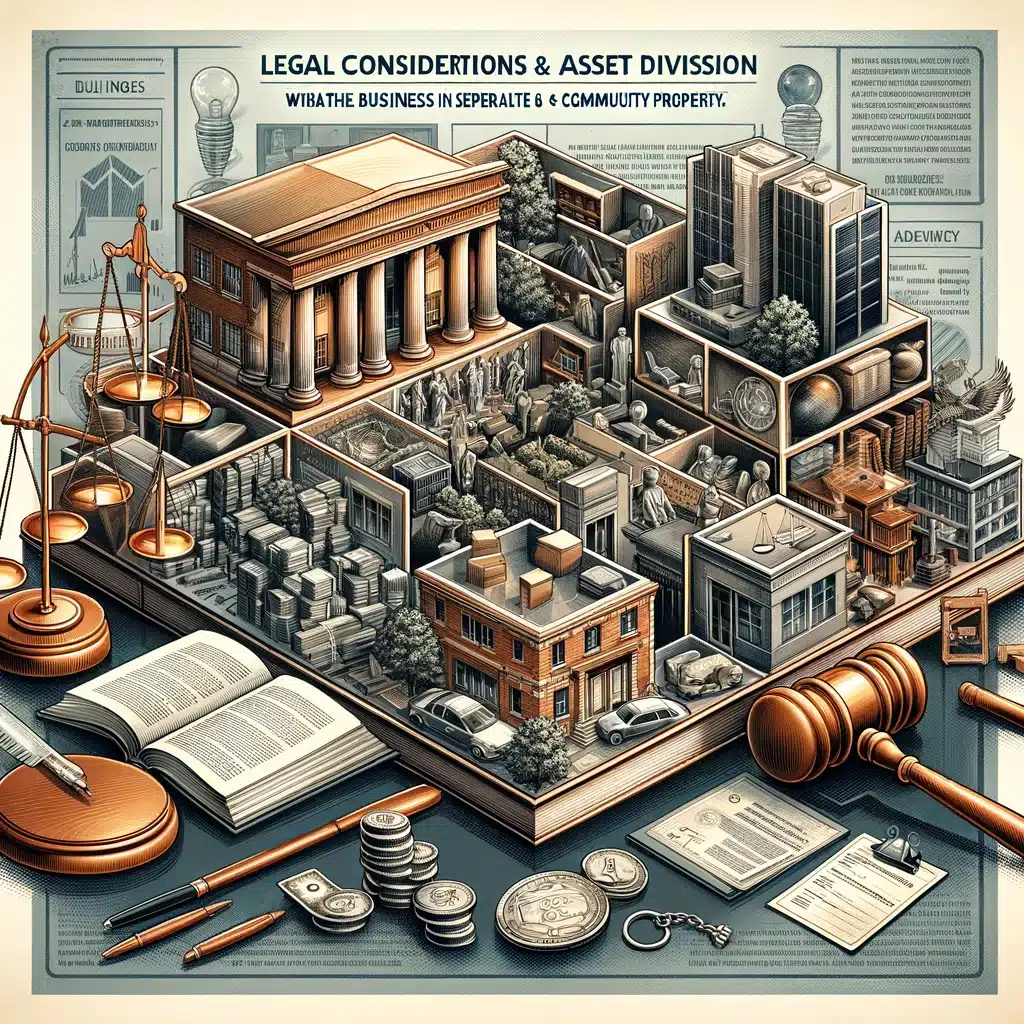Starting a business is exciting—it’s all about chasing success and independence. But what happens when personal challenges, like divorce, mix with your business? In this guide, we’re diving into the often misunderstood topic of “divorce with a business involved.” As business owners, going through divorce brings unique challenges and opportunities. Today, we’re demystifying the process and sharing helpful insights into how business ownership and divorce intersect. Protecting your assets is crucial for financial planning, especially in states like Texas, where laws present unique situations.
When personal and professional lives collide, particularly in a divorce, the stakes are high and the waters murky. For business owners, the impact of a marital split extends beyond the personal sphere, potentially affecting the very livelihood they’ve worked tirelessly to build. Understanding the nuances of “business owners and divorce” is critical. In this article, we’ll explore key aspects like asset division, business valuation, and strategies to safeguard your entrepreneurial achievements during a divorce.

Our journey delves into the heart of navigating a divorce when a business is involved. We’ll offer practical tips, expert advice, and even a touch of humor to lighten the load. From dissecting legal complexities to understanding the emotional ramifications, we’re here to guide you through. Whether you’re a budding entrepreneur or a seasoned business magnate, this article is an invaluable resource for anyone involved in a business facing the prospect of divorce. Let’s embark on this informative exploration together, equipping you with the knowledge and tools to protect your business and emerge stronger on the other side of a divorce.

Navigating Divorce with a Business Involved: A Guide for Entrepreneurs
Embarking on the entrepreneurial path offers the thrill of financial freedom and mastery over your career. However, when divorce becomes part of your personal story, it introduces unique challenges, especially for business owners. Understanding how to handle “divorce with a business involved” is crucial for safeguarding your company’s future.
Legal Considerations for Business Owners in Divorce
As specialists in managing divorce cases for business owners, we’re often asked, “How can I avoid business-related issues when divorcing?” This is a crucial concern, particularly for business owners in Texas navigating the divorce process. One of the central issues in such cases is the division of assets and how this impacts your business.
In Texas, a community property state, the law typically mandates an equal division of assets acquired during the marriage. But what does this mean for your business? It’s vital for business owners going through a divorce in Texas to comprehend that their business will be evaluated in the same way as any other marital property. This understanding is key to preparing for the potential outcomes and implications for your business in the divorce proceedings.
Asset Division: Protecting Your Business
The division of your business hinges on whether it’s deemed community property or separate property. This classification is vital in determining how your business will be treated in the divorce settlement. Additionally, the business’s value is a crucial factor. This valuation encompasses the company’s income, assets, debts, liabilities, and future earning potential.
Business Valuation: A Key Factor in Divorce
For business owners undergoing a divorce, a key question often arises: “Does the type of business matter in a divorce?” Indeed, the type of business can significantly impact its valuation process, which is a crucial step for ensuring a fair and equitable settlement. It’s essential that the valuation of the business accurately reflects its true market worth, encompassing all financial aspects.
Navigating the intersection of “business owners and divorce” requires a nuanced approach, particularly in understanding how different business types can influence the valuation and division process. Our goal is to offer comprehensive guidance to business owners during this challenging time, with a focus on maintaining the stability and growth of your business, irrespective of the type of business and the personal changes you are experiencing.
Divorce and Business Ownership: Understanding Community vs. Separate Property
Navigating a divorce as a business owner introduces unique complexities, especially when it involves both you and your business partner’s spouse. A common question that arises in such situations is, “What happens when my business partner’s spouse and I divorce?” This scenario falls under the umbrella of ‘Business Owner Divorce’ and requires careful consideration.
The critical aspect in this context is determining if your shared business is part of the community estate. This classification, whether the business is deemed community or separate property, is vital in a divorce involving a business. It directly impacts how the business will be addressed and divided in the divorce proceedings.

The Role of Timing in Business Valuation
The inception date of your business is key. If established before your marriage, its initial value and the period between its start and your marriage will significantly influence its classification. Income from a business considered separate property often falls under community property, which is subject to division in a divorce.
Family-Run Businesses: Special Considerations
For family-run businesses, especially those passed down generations, analyzing your specific ownership percentage is vital. This scenario is akin to a business partnership, where each partner’s share must be precisely determined.
Strategies for Business Division in Divorce
There are several paths to consider when dividing a business in a divorce:
- Compensation Without Ownership Transfer: You might compensate your spouse for their share in the community estate without transferring business ownership. This method suits business owners relying on their business for income.
- Selling and Splitting Proceeds: Selling the business and splitting the proceeds is an option if there’s disagreement over division or if the business isn’t profitable enough to compensate the non-owning spouse.
- Continued Co-Ownership Post-Divorce: Although less common, a judge might suggest continued co-ownership in cases where both parties are integral to the business and can cooperate post-divorce.
Expert Guidance for a Smooth Transition
Dealing with “business owners and divorce” requires understanding various aspects: business valuation, financial documentation, debts and liabilities, intellectual property rights, business succession planning, income and support obligations, non-compete agreements, insurance, asset division, and tax implications.
Seeking advice from divorce attorneys and financial experts who specialize in divorces involving businesses is crucial. Their expertise will help you protect your entrepreneurial efforts and navigate both the personal and professional aspects of your divorce effectively.
Understanding Business Division in Divorce for Entrepreneurs
When undergoing a divorce with a business involved, understanding how your business could be divided is crucial. For business owners facing divorce, this process is complex and requires careful consideration of various factors.

Compensation Instead of Division: A Viable Option
One common approach in dividing a business is not to alter the business structure itself, but rather to compensate your spouse for their share in the community estate. This is especially relevant if you, as the business owner, are the primary operator and income earner of the business. In such cases, your soon-to-be ex-spouse would receive a percentage of the business’s value, determined through valuation, as compensation.
Selling the Business: Splitting Proceeds
Another method involves selling the business and dividing the sale proceeds. This scenario often arises when there’s a disagreement on how to divide the business or when the business’s profitability isn’t sufficient to compensate the non-owning spouse adequately.
Continued Joint Ownership: A Less Favored Route
The least favored, but sometimes necessary, method is continued co-ownership post-divorce. This option may be considered if both parties are essential to the business’s operation and have demonstrated the ability to work together amicably. While challenging, this arrangement can be viable under specific circumstances and with clear, cooperative agreements in place.
Key Takeaways for Business Owners in Divorce
Navigating a divorce involving a business demands a balanced approach and often requires expert legal and financial guidance. Whether through compensation, sale, or continued joint ownership, each method has its implications and should be considered in light of the overall marital estate and individual circumstances. As a business owner, it’s important to explore these options thoroughly to ensure a fair and equitable division that respects both your personal and business interests.
Legal Considerations in Divorce with Business Involvement
Divorce proceedings involving a business often require navigating through a maze of legal complexities. Understanding the legal implications, especially in terms of property division, is crucial. The classification of the business as either community or separate property significantly impacts how it is divided. In community property states, businesses started during the marriage are typically considered joint assets, while in equitable distribution states, the focus is on a fair, not necessarily equal, division. Legal guidance is essential in interpreting these nuances and ensuring that the division aligns with state laws and the specifics of your case.

The Impact on Daily Business Operations
A significant concern for business owners undergoing divorce is the impact on the daily operations of their business. Ensuring that the business remains functional and profitable during and after the divorce is vital. Strategies may include keeping the business out of direct dispute, establishing clear operational roles, and considering the long-term business goals. Navigating this aspect requires a delicate balance between personal and professional priorities.
Strategies for Protecting Your Business
Protecting your business during a divorce is paramount. Proactive measures such as prenuptial or postnuptial agreements, establishing clear boundaries between personal and business finances, and considering buy-sell agreements can be crucial. These strategies can help in delineating personal and business assets, thereby simplifying the division process and safeguarding the business’s integrity and continuity.
Navigating Divorce with Expert Support
Divorce with a business involved presents unique challenges and complexities. From business valuation and financial documentation to legal considerations and operational impacts, each aspect requires careful attention. Seeking expert advice from legal and financial professionals experienced in handling such cases is vital. With the right support and guidance, business owners can navigate through the divorce process while protecting their personal and professional interests.
|
Subtopic |
Brief Description |
|
Business Valuation Methods |
Explore various valuation methods: asset-based, market-based, income-based. |
|
Financial Records and Documentation |
Emphasize the importance of accurate financial records and relevant documentation. |
|
Business Debts and Liabilities |
Discuss handling of business debts and liabilities during divorce. |
|
Intellectual Property Rights |
Examine treatment of patents, copyrights, trademarks, etc., in the division of the business. |
|
Business Succession Planning |
Address the impact of divorce on business succession plans, particularly for family-run businesses. |
|
Business Income and Support Obligations |
Discuss calculating spousal or child support based on business income. |
|
Non-Compete Agreements |
Explore the role of non-compete agreements in business divorces. |
|
Business Insurance Coverage |
Highlight the importance of insurance coverage and potential adjustments during divorce. |
|
Business Assets and Inventory |
Discuss division or valuation of physical assets, such as equipment, real estate, and inventory. |
|
Tax Implications and Considerations |
Examine potential tax consequences related to dividing a business in a divorce. |
Navigating Divorce with a Business Involved: Addressing Debts and Assets
Divorce involving business owners introduces unique challenges, particularly when it comes to handling business debts and protecting intellectual property. This comprehensive discussion aims to provide insights for business owners and divorce, focusing on the critical aspects of debt division and asset protection.

Division of Business Debts and Liabilities
In a divorce with a business involved, splitting business debts and liabilities is a critical issue. Distinguishing between personal and business debts and determining the liability of each party are key steps in this process. The manner in which these debts are divided can greatly influence the overall settlement and the future viability of the business. An equitable division of these financial responsibilities is essential to ensure fairness for both parties.
Intellectual Property Rights in Divorce
Intellectual property rights often form a substantial part of a business’s value. In the context of business owners and divorce, it’s vital to understand how these assets are valued and divided. Patents, copyrights, trademarks, and trade secrets can significantly impact the business’s worth. Their proper valuation and division are crucial in achieving a fair settlement that recognizes the value of these intangible assets.
Business Succession Planning Amidst Divorce
For family-run businesses, divorce can complicate succession planning. The process of passing the business to future generations can be disrupted, necessitating a reevaluation of long-term plans. Divorcing couples must carefully weigh the impact of their decisions on the business’s future and the interests of family members. It’s essential to explore solutions that maintain the business’s continuity and protect the legacy intended for future generations.
Expert Guidance for a Fair Outcome
Dealing with divorce as a business owner requires careful navigation of financial and legal complexities. From dividing debts and liabilities to handling intellectual property and succession planning, each aspect demands thoughtful consideration. Seeking expert advice is crucial for ensuring that the business remains stable and the divorce settlement is equitable for all parties involved.
Divorce with a Business Involved: Financial Support and Asset Protection
Navigating a divorce when a business is involved requires a careful balancing act, especially in terms of financial support obligations and asset protection. Business owners and divorce face unique challenges, which this article aims to address with an in-depth discussion of income, support obligations, non-compete agreements, and insurance coverage.

Business Income and Support Obligations
In cases of divorce with a business involved, calculating spousal or child support is a complex task. The process involves a thorough examination of the business’s revenue and the personal income derived from it. This assessment is crucial to establish fair support obligations that account for the ongoing needs of both parties, while also considering the business’s stability and future growth.
Non-Compete Agreements and Divorce
Non-compete agreements are a significant factor in divorces involving business owners. These agreements can affect the division of the business and its valuation. Understanding the enforceability of non-compete clauses is vital for both protecting the business’s competitive edge and ensuring a fair division of assets. The implications of these agreements need to be carefully evaluated to ensure that the divorce settlement respects legal boundaries and business interests.
Business Insurance Coverage in Divorce
Insurance coverage plays a pivotal role in safeguarding business assets during and after a divorce. It is essential to review and possibly adjust existing insurance policies to ensure they provide adequate protection for all relevant parties. This step is critical in preserving the business’s financial security and stability, particularly in the face of potential risks and uncertainties that can arise during divorce proceedings.
Striking a Balance for a Fair Settlement
For business owners undergoing a divorce, achieving a balance between personal financial responsibilities and business asset protection is key. Addressing issues like income and support obligations, non-compete agreements, and insurance coverage requires a nuanced approach. Expert advice and careful planning are essential to navigate these complexities, ensuring that both personal and business interests are fairly represented and protected in the divorce settlement.
Divorce with a Business Involved: Assessing Assets and Navigating Tax Implications
When dealing with a divorce involving business owners, it’s crucial to address the division of business assets and understand the tax implications. This article provides an in-depth look at these aspects to ensure a fair and well-informed settlement for both parties.

Allocating Business Assets and Inventory Fairly
In the context of divorce with a business involved, equitable allocation of business assets and inventory is a key step. This includes a detailed assessment of physical assets such as equipment, real estate, and inventory. Proper valuation of these assets is critical to achieve a fair division, ensuring both parties have a solid foundation post-divorce. It’s essential to approach this process methodically to ensure each asset is appropriately accounted for and valued.
Understanding Tax Implications in Divorce
Navigating the tax landscape is a significant aspect of divorces involving businesses. Various tax considerations, including capital gains taxes, adjustments in tax bases, and potential liabilities, must be taken into account. A clear understanding of these tax implications is vital to avoid unforeseen financial challenges and facilitate a smooth transition for both parties. Properly addressing tax concerns can significantly impact the overall financial outcome of the divorce.
Expert Guidance for a Balanced Approach
Divorce proceedings with business assets involved demand a comprehensive approach, considering both asset division and tax implications. Business owners and divorce require careful analysis and expert guidance to navigate these complexities. Professional advice from experienced divorce attorneys and financial experts is invaluable in such scenarios. By addressing all facets of the divorce process with an analytical and equitable lens, business owners can ensure a fair settlement that paves the way for a stable future, both personally and professionally.
Legal Considerations and Asset Division
Navigating a divorce with a business involved also means understanding the legal implications, particularly concerning asset division. Determining whether the business is considered separate or community property is vital. This classification affects how the business and its assets are divided. Legal guidance is essential to interpret these complexities, ensuring compliance with state laws and fairness in the division process.

Impact on Daily Business Operations
An important concern for business owners undergoing divorce is the potential impact on their business’s daily operations. It’s crucial to maintain the functionality and profitability of the business throughout the divorce process. Strategies might include delineating operational roles and considering long-term goals to minimize disruptions and safeguard the business’s future.
Strategies for Protecting Business Interests
Protecting your business during a divorce involves several proactive measures. These might include prenuptial or postnuptial agreements, establishing clear boundaries between personal and business finances, and considering buy-sell agreements. Such strategies are essential in differentiating personal and business assets, simplifying the division process, and maintaining the integrity of the business.
Expert Guidance for Navigating Divorce
Divorce involving a business demands a nuanced approach to tackle financial, legal, and operational challenges. From valuation methods to legal considerations and strategies for protecting the business, each aspect requires careful consideration. Seeking expert advice from legal and financial professionals is crucial. With the right support and planning, business owners can navigate these complexities, ensuring a fair settlement and a stable path forward for both their personal and professional lives.
|
Valuation Method |
Description |
|
Market Analysis |
Examines how the business compares to similar entities in the market, considering recent sales data and market trends. |
|
Asset Valuation |
Determines the value of tangible and intangible assets, including property, equipment, patents, and trademarks. |
|
Income-Based Approach |
Evaluates the business’s revenue, profits, and future earning potential, often used for service-based businesses and startups. |
Expert Witnesses in Business Valuation
To maintain fairness in the division of business assets, expert witnesses often enter the scene. Forensic accountants and business appraisers play a crucial role in providing impartial valuations, ensuring that both parties get a fair share.

Mediation and Alternative Dispute Resolution
Divorce proceedings can be adversarial, but there’s another path: mediation and alternative dispute resolution. These methods can be highly beneficial for divorcing couples with businesses, as they emphasize amicable settlements and reduce conflicts.
Pre-Nuptial and Post-Nuptial Agreements for Business Owners
For business owners, prenuptial and postnuptial agreements are powerful tools. They not only protect business assets but also clarify how business interests will be divided in case of divorce. These agreements can save you from headaches down the road.
Business Continuity Plans
When a business is a significant source of income, maintaining its operation during and after divorce is vital. Contingency plans and succession planning can help ensure that the business remains stable throughout the divorce process and beyond.

Employee Concerns
Divorce can affect more than just the couple involved—it can also impact employees. Addressing employee concerns, job stability, and maintaining a positive work environment is essential for the business’s continued success.
Business Structuring for Divorce Prevention
Choosing the right business structure from the outset can make a significant difference in a divorce scenario. Limited Liability Companies (LLCs), S-Corporations, or partnerships may offer protection for your business assets in case of divorce.
Hidden Assets and Financial Investigations
Divorces sometimes reveal hidden or undisclosed assets. Uncovering these hidden assets is critical, as they can significantly affect the equitable distribution of assets during divorce proceedings.

Tax-Efficient Divorce Strategies
Divorcing couples with businesses must also navigate the tax landscape. Exploring tax-efficient strategies can help minimize capital gains taxes and other potential tax liabilities, preserving more of your hard-earned assets.
Business Ownership Agreements
Clear and comprehensive ownership agreements, such as shareholder agreements or operating agreements, are crucial. These documents address ownership transitions in the event of divorce and provide clarity for all parties involved.
Protection of Intellectual Property
For businesses built on intellectual property assets like patents, copyrights, and trademarks, divorce can raise questions about their protection. Licensing agreements and safeguarding the business’s brand and reputation become paramount.

Business Counseling and Support Services
Divorce is emotionally challenging, especially when combined with the responsibility of managing a business. It’s important to mention the availability of counseling and support services, which can help business owners cope with the emotional and psychological aspects of divorce while keeping their businesses on track.
Cross-Border and Multistate Business Considerations
Operating a business in multiple jurisdictions adds another layer of complexity to divorce. Understanding how divorce laws and asset division may differ across borders is essential for business owners facing this situation.
Business Relationship Agreements
Partnerships and co-ownership arrangements often come with business relationship agreements. These agreements specify how business interests will be handled in the event of divorce among partners, providing a roadmap for a smoother transition.

Business Debt Management
Managing and dividing business debts is another crucial aspect of divorce. Strategies for determining each party’s responsibility for various liabilities must be carefully considered to avoid financial complications.
Navigating Divorce with a Business: The Way Forward
In conclusion, divorce with a business involved is undeniably complex. However, armed with the right knowledge and guidance, you can confidently navigate this challenging terrain. Seeking professional advice from divorce attorneys and financial experts experienced in business-related divorces is highly recommended.
Remember, the key to a successful outcome is understanding and addressing each of these vital aspects. By doing so, you can protect your hard-earned success and ensure the best possible future for both your personal and professional life.
Conclusion:
Alright, fellow adventurers, we’re nearing the conclusion of our expedition through the intricate jungle of “divorce with a business involved.” Before we part ways, let’s shed some light on what lies ahead in this wild journey.
Imagine this: You’ve packed your business divorce survival kit, buckled up for the ultimate adventure, and you’re ready to tackle whatever comes your way. While the path ahead may twist and turn, you’re equipped with invaluable knowledge and the guidance of experts who have traversed similar terrain.
Now, here’s the real treasure trove: With the insights gained from this guide, you’re primed for success. You understand the importance of valuing your business, navigating through hidden assets, and navigating the complexities of tax implications. Additionally, you’re prepared for unforeseen challenges, such as co-owning your business post-divorce—a scenario that often arises.
As you embark on your own business divorce journey, remember this: You are the protagonist of your story. Armed with the necessary tools, knowledge, and resilience, you have the ability to weather any storm that comes your way.
And if you ever find yourself at a crossroads, reflect on the wisdom shared in this guide—the reliable companion that guided you through the maze of “divorce with a business involved.” So, face those challenges head-on, safeguard your empire, and strive for personal and professional fulfillment.
Who knows? Perhaps one day, you’ll have your own remarkable tale to inspire others. Until then, continue scaling those entrepreneurial peaks, for the adventure of life knows no bounds.

Ebook
![Adobe Stock 62844981[2]](https://www.bryanfagan.com/images/AdobeStock_62844981[2].jpeg) If you want to know more about what you can do, CLICK the button below to get your FREE E-book: “16 Steps to Help You Plan & Prepare for Your Texas Divorce”
If you want to know more about what you can do, CLICK the button below to get your FREE E-book: “16 Steps to Help You Plan & Prepare for Your Texas Divorce”
![Divorce Wasting Assets[4]](https://www.bryanfagan.com/images/Divorce-wasting-assets[4].jpeg) If you want to know more about preparing, CLICK the button below to get your FREE E-book: “13 Dirty Tricks to Watch Out For in Your Texas Divorce, and How to Counter Them” Today!”
If you want to know more about preparing, CLICK the button below to get your FREE E-book: “13 Dirty Tricks to Watch Out For in Your Texas Divorce, and How to Counter Them” Today!”
Other Articles you may be interested in:
- How to handle a high net-worth divorce in Texas
- High Net Worth Divorce / High Asset Divorce
- Business Owners and Business Assets in a Texas Divorce
- Attacking the Enforceability of a Premarital Agreement in a Texas Divorce
- My Fiancé wants me to sign a Texas Prenup. What should I do?
- Dower Contracts and a Texas Divorce
- Can I sue my spouse’s mistress in Texas?
- Does the type of business matter in a divorce?
- Can My Spouse Take Half My Business in a Divorce?
- Dividing a Business: What You Need to Know About Valuation in Divorce
- What happens when my business partner’s spouse and I divorce?
- Buy-Sell Agreements for Businesses in Divorce
- Attacking the Enforceability of a Premarital Agreement in a Texas Divorce
- How to treat your small business in the context of a contested divorce
FAQs – Divorce and Business Interests
Can I lose half my business in a divorce?
No, the division of your business in a divorce is not automatically limited to a 50/50 split. The division depends on various factors such as the nature of the business, its value, and whether it is considered community or separate property. Seek legal advice to understand how the specific circumstances of your case may impact the division.
What is considered a business interest?
A business interest refers to your ownership stake or involvement in a business. It can include shares in a corporation, membership interest in a limited liability company (LLC), partnership interest, sole proprietorship, or any other form of business ownership or investment.
What are legitimate business interests?
Legitimate business interests typically refer to the valid and lawful pursuits associated with operating and maintaining a business. This can include factors such as profitability, market share, customer base, trade secrets, intellectual property, goodwill, and other aspects that contribute to the business’s success and value.
What are significant business interests?
Significant business interests are those that hold substantial value or play a significant role in generating income or financial growth. The determination of significance can depend on various factors, such as the size of the business, its profitability, market position, and potential for future success.
How do you calculate business interest?
The calculation of business interest in a divorce can involve various considerations, including the value of the business, the percentage of ownership, and any relevant factors that affect its financial standing. Valuation methods, such as asset-based valuation, market-based valuation, or income-based valuation, may be used to determine the value of the business interest.
Bryan Fagan, a native of Atascocita, Texas, is a dedicated family law attorney inspired by John Grisham’s “The Pelican Brief.” He is the first lawyer in his family, which includes two adopted brothers. Bryan’s commitment to family is personal and professional; he cared for his grandmother with Alzheimer’s while completing his degree and attended the South Texas College of Law at night.
Married with three children, Bryan’s personal experiences enrich his understanding of family dynamics, which is central to his legal practice. He specializes in family law, offering innovative and efficient legal services. A certified member of the College of the State Bar of Texas, Bryan is part of an elite group of legal professionals committed to ongoing education and high-level expertise.
His legal practice covers divorce, custody disputes, property disputes, adoption, paternity, and mediation. Bryan is also experienced in drafting marital property agreements. He leads a team dedicated to complex family law cases and protecting families from false CPS allegations.
Based in Houston, Bryan is active in the Houston Family Law Sector of the Houston Bar Association and various family law groups in Texas. His deep understanding of family values and his professional dedication make him a compassionate advocate for families navigating Texas family law.




